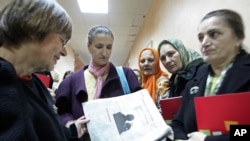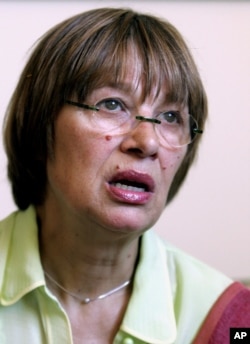Natasa Kandic, who founded a nonprofit to document human rights violations amid the breakup of the former Yugoslavia, has been nominated for the 2018 Nobel Peace Prize by two U.S. lawmakers.
Senator Roger Wicker, a Mississippi Republican who is chairman of the Helsinki Commission, an independent government agency that promotes human rights, military security, and economic cooperation, and Representative Eliot Engel, a New York Democrat who is the ranking member of the House Committee on Foreign Affairs, nominated Kandic, of the Belgrade-based Humanitarian Law Center.
Kandic, who founded the nonprofit in 1992, has won numerous international accolades for her humanitarian work.
"As members of the U.S. Congress, we helped shape the international response to the conflicts, which erupted in the Western Balkans, and we continue to support and encourage post-conflict recovery in the countries of the region," read the nomination letter, jointly drafted by the legislators and submitted to the Norway-based awards organization Wednesday.
"This recognition would further the cause of peace and reconciliation in this and other troubled regions of our world," they said.
Trained as a lawyer, Kandic has been widely credited with furnishing to U.N. war crimes tribunal officials in The Hague critical evidence on Serbia's role in the 1995 Srebrenica massacre of Bosnian Muslim men and boys. Her documentation of atrocities committed by Serb military commanders throughout the 1990s led to prosecutions of Bosnian Serb leader Radovan Karadzic and his military commander, Ratko Mladic.
Now in her early 70s, Kandic has continued to receive death threats, largely because of HLC engagement in Balkan peace and reconciliation campaigns.
In 2017, she began advocating the launch of the Regional Commission for Truth and Reconciliation (RECOM), a fact-finding body tasked with compiling a name-by-name catalog of all people — regardless of ethnicity or nationality — killed, missing, imprisoned or tortured in regional conflicts since the early 1990s.
Kandic told VOA she was overwhelmed and surprised by the nomination, and that the nomination process should nonetheless inspire humility among Balkan-based humanitarians.
"It's good that it is just the nomination," she said in an interview with VOA's Serbian service. "Nothing has changed in this region during the past 25 years. There [is no progress], no new situation which shows that we have become a better civilized society, so I think that the nomination might be too strong."
If, however, leaders of former Yugoslav countries were to sign the agreement to form RECOM at a regional summit scheduled for July, "that would be a big win for civil society in the whole region," she said.
"Victims would be documented, [and] facts about the death of all 130,000 victims would be determined," she said. "We are heading toward it, but we'll see."
This story originated in VOA's Serbian service.





